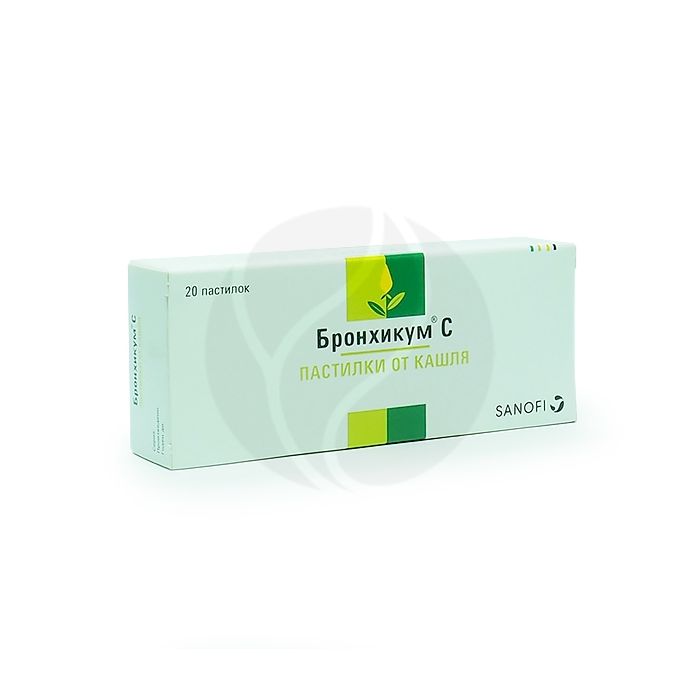Bronchicum C 100mg lozenge, No. 20
Expiration Date: 05/2027
Russian Pharmacy name:
Бронхикум С пастилки 100мг, №20
Lozenges dissolve in the mouth.
Adults and children over 12 years old should dissolve 1-2 lozenges in the oral cavity several times (up to 3 times) a day.
Children aged 6 to 12 years - 1 lozenge 3 times / day.
The duration of the drug is determined by the severity of the symptoms of the disease and its duration.
Lozenges are round, slightly biconvex, cream-colored with small splashes.
1 lozenge liquid extract of thyme herb (1: 2-2.5) 100 mg
Extractant: ammonia solution 10%, glycerol 85%, ethanol 90% (v / v), water (in a ratio of 1: 20: 70: 109).
Excipients: sucrose, povidone, levomenthol, cineole, acacia gum, stearic acid, colloidal silicon dioxide, magnesium stearate.
Chronic heart failure (in the stage of decompensation);
severe impairment of liver and kidney function;
children under 6 years of age;
hypersensitivity to the components of the drug.
pharmachologic effect
Expectorant of herbal origin. It has an expectorant and mucolytic effect.
Pharmacokinetics
In accordance with the International Convention (EMEAHMPWG11 / 99), when conducting clinical trials of herbal preparations, an isolated study of pharmacokinetic parameters is not required.
Side effect
Allergic reactions: possible skin rash, urticaria, angioedema of the face and mucous membrane of the oral cavity and pharynx (Quincke's edema). In this case, you must stop taking the drug and consult a doctor.
Application during pregnancy and lactation
The drug is not recommended during pregnancy and during breastfeeding.
Application in children
Contraindication: children's age (up to 6 years).
special instructions
If there is no improvement in the condition within 5 days, you must consult a doctor.
Information for patients with diabetes mellitus and patients on a hypocaloric diet: 1 lozenge corresponds to 0.07 XE.
Overdose
Data on an overdose of BronchicumЃ C were not provided.
Drug interactions
It is not recommended to take it simultaneously with antitussive drugs, as well as with drugs that reduce the formation of sputum, because this makes it difficult to cough up the liquefied sputum.

